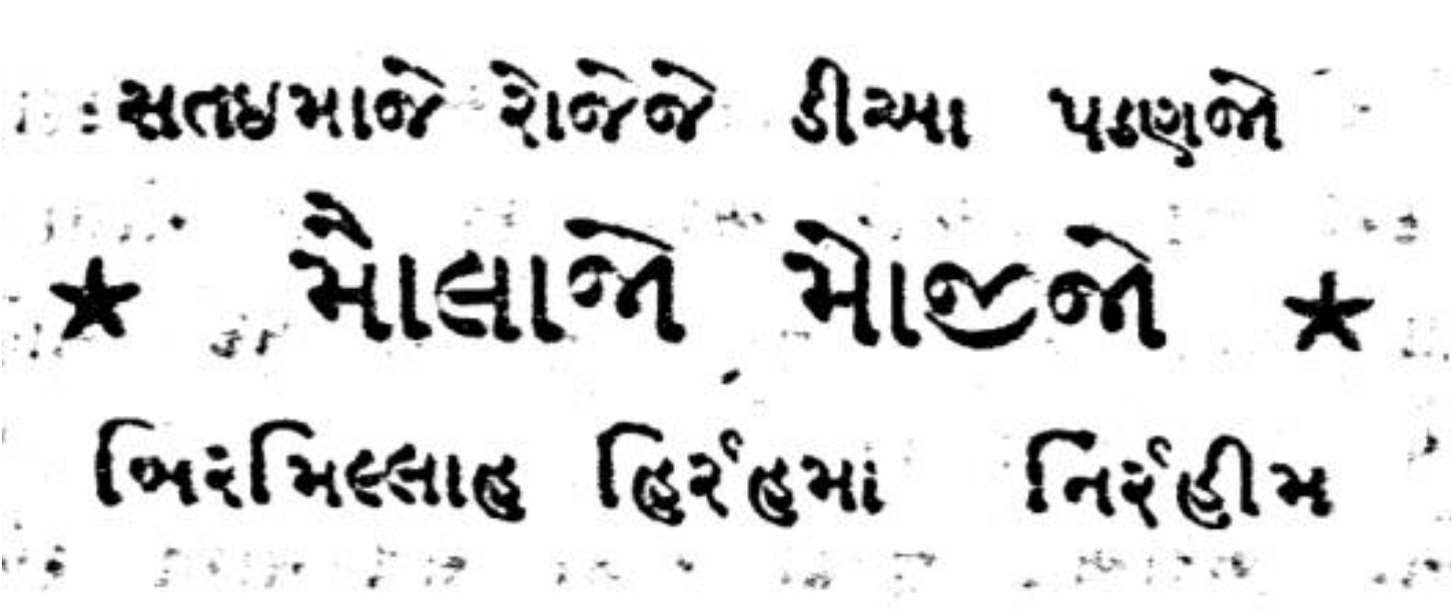Cycle - Cultures vernaculaires et nouvelles élites musulmanes dans l’Asie du Sud coloniale et postcoloniale [2014-2018] |
The Woodcutter’s Tale (Kaṭhiyārōnī Kahāṇī): Historicizing the Indic Narrative Prayers of the Khōjā Caste
Iqbal AKHTAR
[salle 662, 190 avenue de France 75013 Paris]
The Khōjā, an Indic Muslim caste dispersed throughout the Western Indian Ocean littoral in the 19th century, observed narrative prayers and rituals based on a tale of a woodcutter. The woodcutter falls on hard times and meets Ali, the nephew of Muhammad, in a forest and appeals to the master for succour. He is instructed to complete domestic rituals, including a fast, on a particular day each year and doing so becomes prosperous. One year he forgets the ritual and a great calamity befalls him and his family, which is resolved through his wife’s reestablishment of the ritual narrative. This study is based on various versions of this narrative collected from Sindh and Gujarat to Zanzibar from the 19th and 20th centuries as manuscripts and printed texts in Sindhi, Kacchī, Gujarati, and English. Philologically, the evolution of the narrative provides important historical details on the migration of the community from Sindh to Gujarat and the development of the community’s modern Islamic identity. For instance, the title of the tale from the earliest manuscript in the Khōjā script (khōjkī) is ‘The Fast of the Seventh Day’ (sata'īmājō rōjō), which can be (mis)read as ‘The Fast of the Goddess’. In the printed Gujarati script, a new title is foregrounded ‘The Miracle of the Master’ (maulājō mōjījō), which is unambiguously Islamic in reference to Ali. Details within these narratives, when read as an oral tradition, can be useful in reconstructing the geographic transmission of ideas and establishment of Near Eastern authority in the creation of a modern Asian Muslim identity.
Iqbal Akhtar is an assistant professor of Religious Studies and Politics & International Relations at the public Florida International University in Miami. He completed his doctoral programme at the University of Edinburgh’s New College School of Divinity. His forthcoming book is a multidisciplinary historical reconstruction of the development of Khōjā religious identity in Zanzibar and Dar es Salaam.
Les sites du CEIAS
- SAMAJ | The South Asia Multidisciplinary Academic Journal
- CEIAS - Facebook
- CEIAS - Twitter
- CEIAS - Newsletter
- Le Bulletin de la Bibliothèque
- Régionalisme & cosmopolitisme
- DELI | Dictionnaire Encyclopédique des Littératures de l’Inde
- DHARMA | The Domestication of “Hindu” Asceticism and the Religious Making of South and Southeast Asia
- TST | Texts Surrounding Texts
- STARS | Studies in Tamil Studio Archives and Society 1880-1980
- I-SHARE | The Indian Subcontinent’s Shared Sacred Sites
- Sri Lanka et diasporas
- Sindhi Studies Group
- Carnet du Master Études asiatiques
- Master “Asian Studies”
- Social Sciences Winter School in Pondicherry
- Caste, Land and Custom
- Musiques indiennes en terres créoles
 Actualités
Actualités
Devenir juifs : conversions et assertions identitaires en Inde et au Pakistan
 Débat - Mardi 9 mai 2023 - 14:00Présentation« L’an prochain à Jérusalem ! », scande un homme portant une kippa dans une synagogue de Karachi au Pakistan. Ses paroles sont répétées en chœur par les membres de sa communauté, un groupe comptant près de trois cents personnes qui s’autodésignent par (...)(...)
Débat - Mardi 9 mai 2023 - 14:00Présentation« L’an prochain à Jérusalem ! », scande un homme portant une kippa dans une synagogue de Karachi au Pakistan. Ses paroles sont répétées en chœur par les membres de sa communauté, un groupe comptant près de trois cents personnes qui s’autodésignent par (...)(...)
Le Centre d'études sud-asiatiques et himalayennes (Cesah), nouveau laboratoire de recherche (EHESS/CNRS) sur le Campus Condorcet
Échos de la recherche -Depuis le 1er janvier 2023, l'EHESS, en tant que co-tutelle, compte un nouveau centre de recherche né de la fusion du Centre d'études de l'Inde et de l'Asie du Sud (CEIAS - EHESS/CNRS) et du Centre d’études himalayennes (CEH - CNRS) : le Centre d'études sud-asiatiques et h (...)(...)
Centre d'Études de l'Inde et de l'Asie du Sud
UMR8564 - CNRS / EHESS
54 boulevard Raspail
75006 Paris, France
Tél. : +33 (0)1 49 54 83 94
Communication :
nadia.guerguadj[at]ehess.fr
Direction :
dir.ceias[at]ehess.fr
La bibliothèque du CEIAS
Maison de l'Asie
22 avenue du Président Wilson 75016 Paris
54 boulevard Raspail
purushartha[at]ehess.fr



